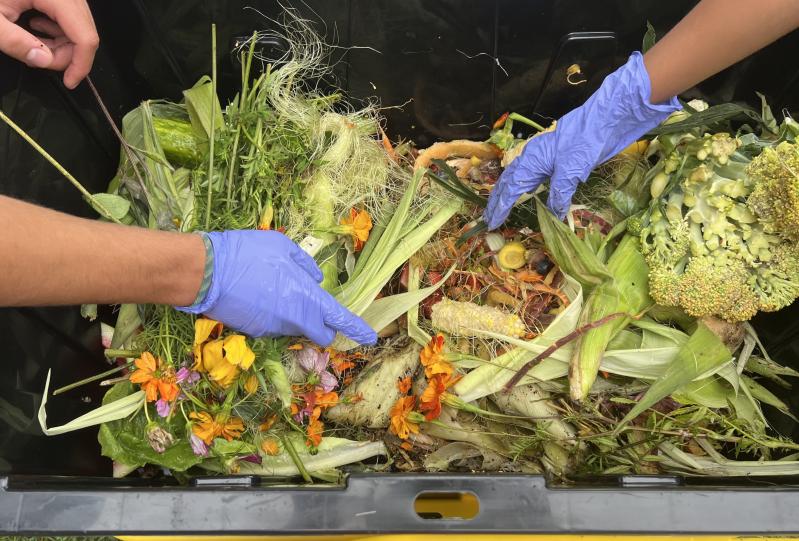There will be more opportunities for East Hampton Town residents to transform their food scraps into healthy soil this year, thanks to East Hampton Compost. The loose collaboration between ReWild Long Island and the town is in its second year.
Amber Waves Farm in Amagansett will be a new drop-off location starting on May 22. And this year, tables at the Springs and Sag Harbor farmers markets will begin accepting scraps earlier, on May 18 (last year both didn’t begin until mid-July).
Volunteers, often high school students, help sort the refuse at the tables, removing items like produce stickers, rubber bands, and so-called compostable plastic bags, which Gloria Frazee, a founding member of ReWild Long Island’s East End chapter, said “are generally not compostable.”
“We give immediate feedback to people dropping off the scraps,” Ms. Frazee told the town board on April 16. “Last year we sorted through 3,000 pounds.”
Fruits and vegetables can always be composted, while meat, fish, dairy products, and oils cannot be. A full list of acceptable compostables is at easthamptoncompost.org.
Last year the program grew through the summer. In the first week, volunteers sorted through 56 pounds of food scraps. “By the end, we were over 450 pounds a week,” Ms. Frazee said. “It became part of everyone’s Saturday routine.” A total of 500 pounds of compost was the net result.
Ms. Frazee discussed with the board the two main benefits of composting: environmental and economic.
Food waste from the town is trucked to Hempstead, where it is ultimately incinerated, adding greenhouse gases to the atmosphere. She showed a map of what East Hampton Town is projected to look like when current high school seniors are old enough to retire, if sea levels continue to rise at their present pace.
“It’s a series of archipelagos,” she said. On a more microenvironmental level, properly composted food adds nutrients back into the soil. When fruits and vegetables are grown in healthy soil, they give those nutrients to their consumers, and a positive cycle is created.
“Farmers know it takes healthy soil to make healthy produce,” she told the board, handing out two potatoes, one from locally composted soil and another from a supermarket shelf. All agreed the potato from composted soil had a superior aroma. “Who wants to eat vegetables grown in a herbicide and pesticide-
laden field?”
“Thank you, Gloria, for being the engine behind composting from the inception,” Councilwoman Cate Rogers said. “There are changes to our lifestyle we can make that are easy, and ones that are harder,” Councilman Tom Flight said. “This is one that is relatively easy for people to do at home.”
“Right now, I want more volunteers and more participants so we can get more households involved,” Ms. Frazee said.




